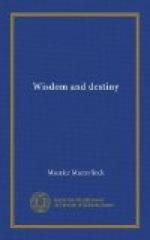38. Is the sage never to suffer? Shall no storm ever break on the roof of his dwelling, no traps be laid to ensnare him? Shall wife and friends never fail him? Must his father not die, and his mother, his brothers, his sons—must all these not die like the rest? Shall angels stand guard at each highway through which sorrow can pass into man? Did not Christ Himself weep as He stood before Lazarus’ tomb? Had not Marcus Aurelius to suffer—from Commodus, the son who already showed signs of the monster he was to become; from Faustina, the wife whom he loved, but who cared not for him? Was not destiny’s hand laid heavy on Paulus Aemilius, who was fully as wise as Timoleon? did not both his sons die, one five days before his triumph in Rome, and the other but three days after? What becomes of the refuge, then, where wisdom keeps watch over happiness? Must we take back all we have said? and is wisdom yet one more illusion, by whose aid the soul would fain conciliate reason, and justify cravings that experience is sure to reject as being opposed to reason?
39. Nay, In truth, the sage too must suffer. He suffers; and suffering forms a constituent part of his wisdom. He will suffer, perhaps, more than most men, for that his nature is far more complete. And being nearer to all mankind, as the wise ever must be, his suffering will be but the greater, for the sorrows of others are his. He will suffer in his flesh, in his heart, in his spirit; for there are sides in all these that no wisdom on earth can dispute against destiny. And so he accepts his suffering, but is not discouraged thereby; not for him are the chains that it fastens on those who cringe down before it, unaware that it is but a messenger sent by a mightier personage, whom a bend in the road hides from view. Needs must the sage, like his neighbour, be startled from sleep by the shouts of the truculent envoy, by the blows at the door that cause the whole house to tremble. He, too, must go down and parley. But yet, as he listens, his eyes are not fixed on this bringer of evil tidings; his glance will at times be lifted over the messenger’s shoulder, will scan the dust on the horizon in search of the mighty idea that perhaps may be near at hand. And indeed, when our thoughts rest on fate, at such times as happiness enfolds us, we feel that no great misfortune can be suddenly burst upon us. The proportions will change, it is true, when the blow falls; but it is equally true that before the misfortune can wholly destroy the abiding courage within us, it first must triumph in our heart over all we adore, over all we admire, and love. And what alien power can expel from our soul a feeling and thought that we hurl not our selves from its throne? Physical suffering apart, not a single sorrow exists that can touch us except through our thoughts; and whence do our thoughts derive the weapons wherewith they attack or defend us? We suffer but little from suffering itself; but from the manner wherein we accept it overwhelming sorrow may spring. “His unhappiness was caused by himself,” said a thinker of one whose eyes never looked over the brutal messenger’s shoulder—“his unhappiness was caused by himself; for all misery is inward, and caused by ourselves. We are wrong in believing that it comes from without. For indeed we create it within us, out of our very substance.”




